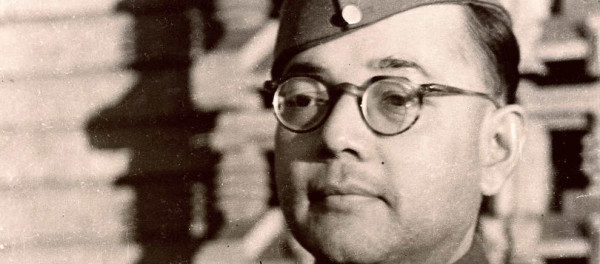BY RSN SINGH
Since some papers of the Intelligence Bureau on Subhash Chandra Bose and his family have come into the public domain, there has been a concerted campaign by a section of the media to vilify the national hero. An article in a prominent English news daily went to the extent of declaring that Subhash was of the strong opinion that post-independence, India should be under a dictatorial rule for 20 years. In a way, the article sought to justify the incarceration and subsequent killing of Subhash. The pro-British, pro-Nehru and anti-Subhash constituency still exists. From the tenor of this anti-Subhash lobby it can be extrapolated that how vicious must have been the British and Congress intrigues against Subhash during World War II and subsequent to his disappearance, considering the fact that it was only Subhash who was fighting for overthrow of the British , all the top Congress leaders were in jail during that period.
What political philosophy Subhash desired or would have pursued is a matter of conjecture. The moot question that the IB documents pose is as to why the family of Subhash was kept under surveillance for two decades after independence, and most deploringly, why was the surveillance report being shared with the British intelligence agency, the MI5. What common interest did the MI5 and Nehru have? If Nehru did know about the real truth about Subhash, i.e. about his alleged incarceration or alleged murder, how did he live with the murderous guilt?
The sharing of intelligence with a foreign intelligence agency, rather former colonial master on a revered freedom fighter, who was also the Congress President at one time, lends some credence to the insinuations about certain leaders in the Congress of pre-independence era having links with MI5, primarily to marginalize the extremists. The hatred for Subhash in the Gandhi-Nehru camp is a historical fact. This hostility compelled Subhash to resign as Congress President in 1939, despite being democratically elected. Hence the question as to who were fascists and who were liberal democrats in the pre-independence Congress will always remain.
Subhash’s resignation as Congress President nearly coincided with the outbreak of World War II. In fact, during that period the war clouds in Europe were already hovering. Was his resignation, therefore, engineered by external agencies? No sooner after the outbreak of World War II, the Congress ministries in the eight provinces resigned in 1939. Jinnah described this as ‘day of deliverance’. Thus the onset of the World War II made the gulf between Congress and Muslim League unbridgeable. In the same year, in the Wardha session, the Congress Working Committee supported the fight against fascism, but did not countenance India joining the war effort. Gandhi did not support Britain as he was not reconciled to war, but later supported the same on the plea that he did not seek to raise a ‘free India from ashes of Britain’. Apparently, the Congress leaders decried the employment of Indian soldiers in the war without their consent and guarantee of Independence, but did nothing to deter the British. This was despite the fact that between 1940 and 1943 Bengal faced one of the worst famines in Indian history. Indians starved while tons of Indian food were being supplied to sustain British forces. Public sentiments against the Congress leaders was turning hostile.
Belatedly, and guided purely for imperatives of political relevance, on 8th August 1942, Gandhi launched ‘Quit India Movement’. Immediately the entire top leadership of Congress was taken into custody. Leaderless and rudderless the movement died in a years’ time, but the Congress leaders remained in prison till the rest of the war. This served the interest of the British and as well as the reputation, prestige and political prestige of Congress leaders. Some Congress leaders like Jaiprakash Narain who genuinely fought the British during the movement never made a political career post-Independence. What was the sacrifice of the top Congress leaders therefore? Mass movements by the Congress between 1920 when Gandhi arrived on the scene and 1947 were niggardly, and hardly upset the British.
The ‘Quit India Movement’ failed to galvanize India to efficacious magnitude and intensity. Those arrayed against it included Viceroy’s Council (majority Indians), Jinnah (Muslim League), Communist Party of India (supported when Russia entered war), and Princely States. There were many Congress leaders too who had advised against the movement. How could Jinnah’s support to the British gone unrewarded! He ultimately did get his reward in form of Pakistan!
It was during this period, when the Congress leaders were ineffective that Subhash Chandra Bose was exerting himself for India’s independence. He first escaped to Germany then to Japan and subsequently raised the Indian National Army (INA) and setup a provisional government of Free India in Singapore in July 1943. In October same year, he flew to Tokyo to participate in the Greater East Asia Co-Prosperity Sphere meet.
The Congress Party and some Indian commentators maintain that Subhash sided with the wrong side, i.e. the Axis powers, who were fascists. Well, all that Subhash did was to exploit the vulnerability of the British for gaining India’s independence. It was a perfectly nationalist and moral move. The British all through their rule had missed no opportunity in mutilating India’s history and creating religious and fissures in Indian society. Two instances in this regard are glaring:
- The most diabolical attack on India’s cultural unity was by Lord Minto, who in 1906 encouraged the Aga Khan to submit a proposal for ‘separate electorate’ for Muslims. Durga Das in his book ‘India from Curzon to Nehru and After’ on page 50 writes, “On him (Aga Khan) had been conferred the status of ‘leader of the Muslims in India’”. Durga Das does not fail to point out that on independence Aga Khan forswore Indian citizenship even as 50 million of his co-religionists remained in the country after Pakistan had been created. Minto in accepting Aga Khan’s demands with alacrity, tried to drive a wedge in Hindi-Muslim unity by describing the Muslims of India as ‘the descendants of conquering and ruling race’. Durga Das reminds that ‘majority of Indian Muslims are converts from Hinduism and not descendants from Turks, Persians, Pathans or Mughals’.
- The conspiracy by Lord Minto is best described by Arun Shourie in his book ‘Missionaries of India’ on page 196. He quotes an article by Lady Minto on Aga Khan’s demand for separate electorate, wherein she wrote: “This has been a very eventful day; as someone said to me, ‘an epoch in Indian History’. … A very big thing has happened today, a work of statesmanship that will affect India and Indian history for many a long year. It is nothing less than the pulling back of 62 millions of people from joining the ranks of the seditious opposition.”
- Another attack on India’s cultural unity was through the vector of ‘census’. Again, Arun Shourie further quotes M Macauliffe’s lecture on the ‘Sikh Religion and its Advantages to the State’ in 1903: “At former (census) enumerations village Sikhs in their ignorance generally recorded themselves as Hindus, as indeed they virtually were. With the experienced gained by time, a sharp line of demarcation has now been drawn between Sikhs and Hindus…”. He further states that apart from census demarcations, ceremonies to instill and widen feelings of separateness amongst Sikhs in the Army were deliberately introduced.
Post-Independence too and till date, the British have harboured many Indian secessionists leaders and organisations on their soil. So what was wrong in Subhash Chandra Bose exploiting the then prevailing vulnerability of the British. Moreover, how was the Congress Party entitled to decide which of the two, i.e. Allied or Axis powers were a moral and righteous force to be sided with. Indians at that time were slaves of the British, and leaders of slaves if not in collusion with masters, should only be guided by the ‘objective of liberation’. Subhash was purely guided by this objective.
India’s most revered historian RC Mazumdar has written about the views ascribed to Clement Attlee on compulsions of the British for grant of Independence. As per the former British prime minister, apart from many reasons, the decision to grant independence to India was majorly influenced by the impact of Subhash Chandra Bose and his INA. The INA in fact had wrecked the precise instrument of the British rule, the armed forces. Its reverberations manifested in the naval mutiny in 1946 in which 20,000 sailors, 78 ships and 20 shore establishments were involved. There were also mutinies in an Army unit at Jabalpur and Air Force base at Karachi. During the period of World War II, when the Congress leaders were in jail, 26,000 INA men sacrificed their lives for liberation of India. It constitutes nearly half of INA.
Moreover, nearly 2.5 million Indian soldiers had been demobilized after World War II. This huge force too was restive, and inspired by Subhash, the INA and its nationalism. It became impossible for the British to hold India. It was also impossible for Nehru to rule India with Subhash around. It was impossible for the British to create Pakistan with Subhash at the helm.
In the backdrop of the fresh revelations, it is time to reflect whether the Gandhian method delivered or Subhash got us independence, whether the lawyers approach (most Congress leaders were Bar-at-Law) or Netaji’s jolt made the British leave. Post-independence, the same Congress used force to liberate Goa from another colonial power, Portugal. The lawyers approach probably did not succeed because there was no MI5 to collude with the Congress Party, which has ruled this country for most years. The party will obviously be nervous about any revelation of the fate of Subhash and his crucial role in securing India’s independence.
(RSN Singh is a former military intelligence officer who later served in the Research & Analysis Wing. The author of two books: Asian Strategic and Military Perspective and Military Factor in Pakistan, he is also a Guest Blogger with Canary Trap. The opinions expressed by the author and those providing comments are theirs alone, and do not reflect the opinions of Canary Trap or any employee thereof)

